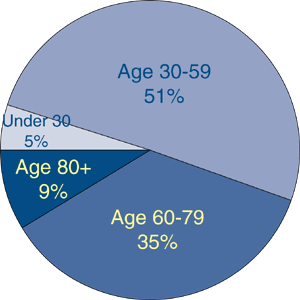I am a super voter. I am an activist. I am a door knocker. I am a precinct walker. I am a phone banker. I am not eligible for AARP. I am electorally irrelevant.
I am an oddity, an involved young voter in Allegheny County and since I am an oddity within my peer group, there is no reason for politicians to court my vote, or cater to my interests past the generic pledges of public safety and decent schools, although most are not willing to recognize the fact that I may be willing to pay the same or more in property taxes if that means the schools will be proportionally or absolutely better for the day that my wife and I do have kids.
Political campaigns and candidates may court me as an activist, but that is a different dance than the dance that candidates put on for their winning coalition of voters. The winning coalition of primary voters in this region is some combination of AARP eligible senior citizens and public sector employee unions which also means an older than me population.
Chris Briem at Nullspace looked at the 2003 municipal election primary turnout data and created an amazing chart that demonstrates how irrelevant someone like me is to the political calculus.

Look at that some. Basically for every voter under age 30 (not under 20.. under Thirty) there are 8 voters age 60 and over. There were actually two voters over 80 for everyone under 30 who cast a ballot. That really is an amazing ratio. And this is for the county as a whole. There are parts of the county much older than the average. Can you imagine what this pie chart looks like there?....
So consider you are looking for voters...Add all that up.. and if you come up with a calculated 'value' per voter of finding and convincing them to vote for you.. the ratio for those over 60 vs those under 30 approaches an order of magnitude. Not many elections outside of Pittsburgh can say anything like that extreme. Thus supervoters have even older age demographics than the averages above show.....
I think the bigger issue is that our demographics are what the nation will look like in coming decades. Extrapolating from our voting patterns will give a peak what national voting patterns are going to look like. Worth some thought.
It is definitely worth some thought as this is not just a Pittsburgh issue. It is the reason why I have no worries about the solvency of Social Security as a coalition of Baby Boomers and the children of Baby Boomers who don't want Mom and Dad to live with them will make sure that the Boomers can maintain a reasonable degree of fiscal independence even if the Boomers did not do enough to save for the retirement that they thought they would have had. This is why I have no worries about the long term problems of Medicare A,B or D. The Baby Boomer voters will make sure that they elect people who make sure they can go to the doctor and hospital and pharmacy and nursing home easily and seemingly cheaply. This is why I worry about pretty much everything else.
The dominance of gray power is an international event. Ian Welsh at the Agonist picked up an interesting article from the UK Independent last week that looked at the winning coalition for conservative French President Sarkozy:
In an election restricted to French voters aged 18 to 59, Mme Royal would have won handsomely. M. Sarkozy owes his victory to a "wrinkly" landslide with an overwhelming triumph among French voters in their sixties (61 per cent of the vote) and a jackpot among the over-seventies (68 per cent).
Ian continues with some political analysis on the gray hair coalition and its priorities compared to the rest of the population:
what happened in France was the old folks telling the young folks that the protections the oldsters enjoyed thier entire lives; the easy jobs they enjoyed their entire lives; are being taken away. It's real easy to vote for tough medicine for someone else, and that's what just happened in France.
If the French parliamentary elections return a body that Sarkozy can work with, under 60s are about to get bent over the table.
There's a lot of "death bet" BS going on in the world today. From pollution, to asset bubbles like the housing bubble, to a refusal to deal with debt and deficits, and an absolute refusal to allow taxation at necessary levels or to invest in infrastructure or education, old folks have constantly voted for not reinvesting in society. Their bet is that they'll die before the lack of reinvestment; or the lack of environmental care, comes back to bite them in the ass.
So what is the solution to deal with this system wide death bet and reasonably short time horizons of social, governmental and fiscal policy planning? I don't know yet, besides seeking to find ways to create a counterbalancing political force that has a multi-generational shadow of the future and thus long discount periods. Can we do that? I don't know, I hope so.
No comments:
Post a Comment